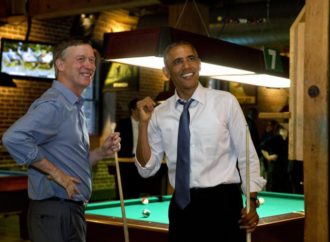Doing his best Barack Obama rule-by-fiat impersonation, Governor John Hickenlooper signed an Executive Order (EO) to compel Colorado ratepayers to pay for compliance with the Paris Climate Treaty from which President Trump recently withdrew the United States.
For someone who follows state level energy and environmental activity, this was a surprise. Usually these things get leaked, but not this time. The Governor did a good job keeping it quiet. More on the secrecy in a minute.
Reviewing the specifics of the EO – including a carbon reduction goal from the electricity sector of 35 percent below 2012 levels by 2030 and an electric vehicle (EV) infrastructure buildout, it seems like an industrial wind and EV corporate welfare program.
The Governor also declared that he will drag Colorado ratepayers into the U.S. Climate Alliance, a loosely knit group of mayors and governors united by a hashtag and their willingness to drive up electric rates and subsidize the driving habits of a privileged few.
How will the Governor’s EO impact global warming? It’s likely there will be no measurable impact on the climate because even if every country that signed on to Paris complied, the impact would be negligible as Danish statistician Dr. Bjorn Lomborg, the President of the Copenhagen Consensus Center, explained:
We will spend at least one hundred trillion dollars in order to reduce the temperature by the end of the century by a grand total of three tenths of one degree…the equivalent of postponing warming by less than four years…Again, that is using the UN’s own climate prediction model.’
Lomborg added,
These miniscule benefits do not come free — quite the contrary. The cost of the UN Paris climate pact is likely to run 1 to 2 trillion dollars every year.
How will this impact Colorado ratepayers? As Lomborg suggests, Paris on a global level would be wildly expensive. So, at the state level, it will certainly drive up the cost of electricity. We’ve already felt the financial impact of mandated fuel switching, industrial wind mandates, and demand-side management – skyrocketing electricity rates.
Understandably, the Senate Majority Office is angry because the main policy initiatives – industrial wind and EV infrastructure – were subjects of legislation that Republicans helped kill during 2017 session.
In a press release, Senator Ray Scott (R-Grand Junction) Chair of the Senate Select Committee on Energy and Environment had harsh words and suggested possible legal action:
The governor would be ill-advised to attempt to ram that change through the Public Utilities Commission without General Assembly approval. Any rubber-stamp action by the governor’s appointees on PUC will be met by strong opposition – in court and most likely at the ballot box, said Scott. The governor’s failure to proceed in an open, collaborative, bipartisan way means this policy never will have the stamp of public legitimacy it needs — and that it most likely will be challenged in court.
This may turn the 2018 budget debate into Must-See TV.
As mentioned earlier, the Governor kept this one close to the vest. The lack of any public, collaborative process means a lot of stakeholders and lawmakers were not involved and may be looking for a pound of flesh.
According to sources at the EO press conference and signing ceremony, Xcel Energy was in attendance while others in the electricity generation industry didn’t even know about it. I don’t think that was by accident because Xcel was behind both increased industrial wind and ratebasing EV infrastructure bills that failed, with industrial wind being the most pressing for the monopoly utility as I have explained here and here.
This begs the questions, was the EO really just an Xcel Energy corporate welfare program masquerading as a climate change initiative? What Xcel couldn’t get in in the state legislature, did get through an EO? In which case, no wonder the Governor kept everyone in the dark.








